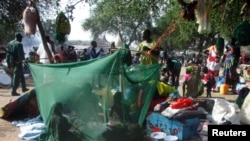The U.N. estimates more than 200,000 people have been displaced within South Sudan by ongoing fighting. Another 10,000 people have fled to neighboring countries.
U.N. refugee agency spokesman Daniel MacIsaac said the UNHCR is trying to maintain access to those in need despite fighting across at least seven states.
“We are extremely concerned, of course, about the safety of refugees and about south Sudanese who are displaced within their own country. We’re also seeing that access to these people is affected by what we call insecurity, basically, the danger, the fighting and that type of thing, too.”
Many of the displaced in South Sudan have sought refuge at U.N. bases in Juba, Bor, Pibor, Malakal and Bentiu. MacIsaac says the agency is assisting at those locations.
“Approximately 75,000 people – although that does change –have taken shelter at these different U.N. bases or compounds around the country. So as a result that’s a huge responsibility to protect those people, as well as to simply house them. And that’s been going on for almost two weeks as well. UNHCR – because of our expertise – we are certainly among the U.N. agencies and other partners who are helping to provide supplies to these people be it sleeping mats, tents, food and water. So we’re helping coordinate that,” he said.
Those fleeing across South Sudan’s borders are being helped by a variety of agencies and government ministries.
MacIsaac said, “There’s good cooperation with the governments, be it Ethiopia, Kenya, Uganda and even in Sudan, of course, as well -- together with our NGO partners in those countries. And then we would help operate transit centers where we would register, take information, find out the needs. We also interview any refugees about what’s the situation back where you came from? Why did you flee, in particular? What are you seeing on the road? -- To give us an idea of [whom] else might be coming.”
Besides helping the displaced -- and those who’ve fled to other countries -- UNHCR continues to support about 210,000 refugees from neighboring Sudan. Most are in the Yida and Ajoung Thok camps in Unity State in northern South Sudan. There are also refugee camps in Maban County in Upper Nile State.
“The situation has been changing literally every day. So it is some we have to really monitor, even in terms of getting supplies from the capital Juba or from outside the country as required,” he said.
The UNHCR said it’s also focusing on child protection, saying many family members have been separated while trying to escape the fighting.
U.N. refugee agency spokesman Daniel MacIsaac said the UNHCR is trying to maintain access to those in need despite fighting across at least seven states.
“We are extremely concerned, of course, about the safety of refugees and about south Sudanese who are displaced within their own country. We’re also seeing that access to these people is affected by what we call insecurity, basically, the danger, the fighting and that type of thing, too.”
Many of the displaced in South Sudan have sought refuge at U.N. bases in Juba, Bor, Pibor, Malakal and Bentiu. MacIsaac says the agency is assisting at those locations.
“Approximately 75,000 people – although that does change –have taken shelter at these different U.N. bases or compounds around the country. So as a result that’s a huge responsibility to protect those people, as well as to simply house them. And that’s been going on for almost two weeks as well. UNHCR – because of our expertise – we are certainly among the U.N. agencies and other partners who are helping to provide supplies to these people be it sleeping mats, tents, food and water. So we’re helping coordinate that,” he said.
Those fleeing across South Sudan’s borders are being helped by a variety of agencies and government ministries.
MacIsaac said, “There’s good cooperation with the governments, be it Ethiopia, Kenya, Uganda and even in Sudan, of course, as well -- together with our NGO partners in those countries. And then we would help operate transit centers where we would register, take information, find out the needs. We also interview any refugees about what’s the situation back where you came from? Why did you flee, in particular? What are you seeing on the road? -- To give us an idea of [whom] else might be coming.”
Besides helping the displaced -- and those who’ve fled to other countries -- UNHCR continues to support about 210,000 refugees from neighboring Sudan. Most are in the Yida and Ajoung Thok camps in Unity State in northern South Sudan. There are also refugee camps in Maban County in Upper Nile State.
“The situation has been changing literally every day. So it is some we have to really monitor, even in terms of getting supplies from the capital Juba or from outside the country as required,” he said.
The UNHCR said it’s also focusing on child protection, saying many family members have been separated while trying to escape the fighting.





